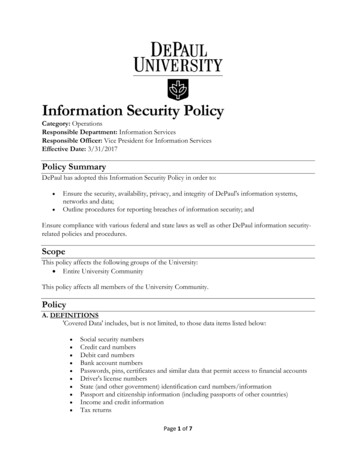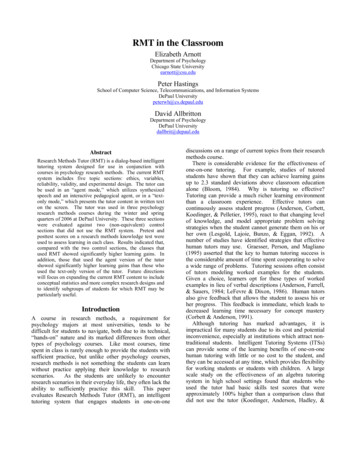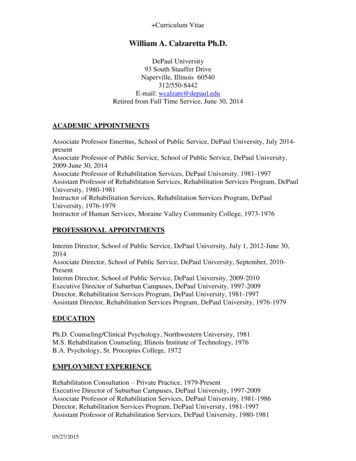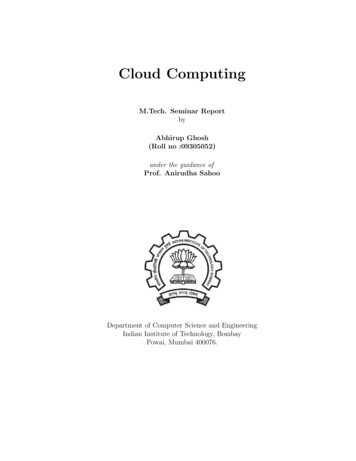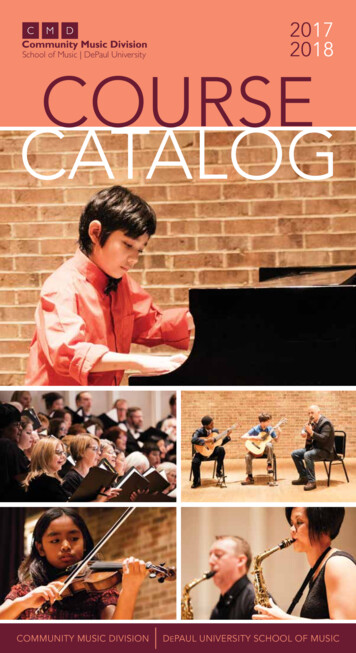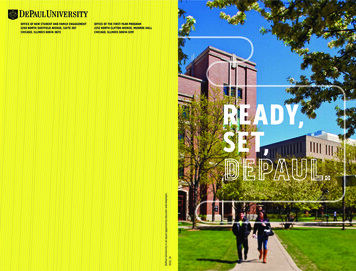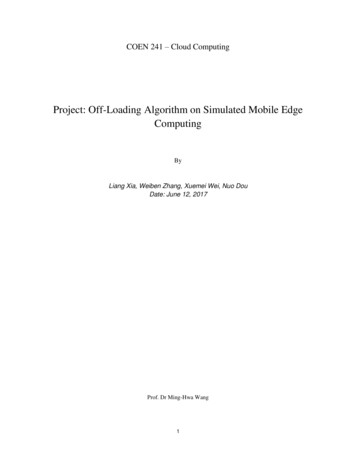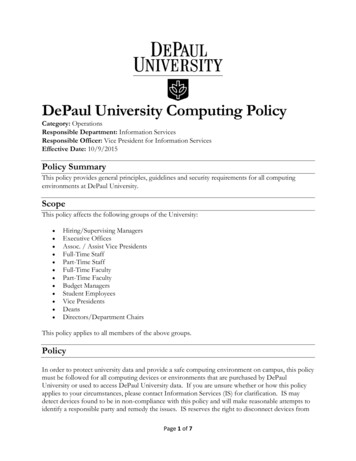
Transcription
DePaul University Computing PolicyCategory: OperationsResponsible Department: Information ServicesResponsible Officer: Vice President for Information ServicesEffective Date: 10/9/2015Policy SummaryThis policy provides general principles, guidelines and security requirements for all computingenvironments at DePaul University.ScopeThis policy affects the following groups of the University: Hiring/Supervising ManagersExecutive OfficesAssoc. / Assist Vice PresidentsFull-Time StaffPart-Time StaffFull-Time FacultyPart-Time FacultyBudget ManagersStudent EmployeesVice PresidentsDeansDirectors/Department ChairsThis policy applies to all members of the above groups.PolicyIn order to protect university data and provide a safe computing environment on campus, this policymust be followed for all computing devices or environments that are purchased by DePaulUniversity or used to access DePaul University data. If you are unsure whether or how this policyapplies to your circumstances, please contact Information Services (IS) for clarification. IS maydetect devices found to be in non-compliance with this policy and will make reasonable attempts toidentify a responsible party and remedy the issues. IS reserves the right to disconnect devices fromPage 1 of 7
the DePaul network as needed to ensure a safe and secure computing environment. Individuals,departments, or units owning computing devices shall bear the costs of ensuring compliance withthis policy. If you are unable to comply with portions of this policy, please contact InformationServices to discuss exceptional situationsGeneral Principles for All Computing EnvironmentsPasswords Devices must be protected by strong passwords that are resistant to dictionary attacks.Configurations and selected passwords should follow the password guidelines detailed in theAccess to and Responsible Use of Data policy.Passwords must be encrypted in transit and in storage.Default passwords should always be changed when initially configuring a device.User Accounts Use of group or shared user accounts is strongly discouraged so DePaul University canmaintain individual accountability across its technology systems.Guest accounts should be disabled.Default superuser accounts should be renamed when possible on Windows operatingsystems.On an ongoing basis, system administrators are responsible for ensuring that only authorizedusers retain access to resources. Further details regarding review requirements for access tosensitive data can be found in the Access to and Acceptable Use of Data policy.Updates and Patches Patches impacting the functionality or availability of software or systems must be applied ina timely fashion.Critical security patches (as designated by the vendor) should be applied immediately or assoon as reasonably practical.o Testing the patch (or validation that others have tested it) before applying it toproduction environments is recommended to avoid unintended service disruptions.o While Information Services will deploy critical security patches for some softwareand systems, end-users and other administrators are responsible for therest. Generally speaking, though not in all cases, the person or entity whichperformed the initial system or software installation should be responsible forpatching. For a list of what software and systems Information Services will patch,visit r assistance assessing the potential impact and importance of released patches, contactInformation Security at security@depaul.eduGeneral ControlsPage 2 of 7
Configure auto-logoff or auto-screen locking to trigger after 30 minutes of inactivity,requiring a password on wake.If a device outside DePaul University's datacenters is network connected, and the operatingsystem includes a software firewall, activating the firewall is a minimum requirement.Display the following notice prior to allowing access to the system:This is a DePaul University resource. This computer system, and all related equipment, networks, and networkdevices are provided for authorized use only and are subject to DePaul's Acceptable Use Policy. DePaul may accessand monitor university computing resources and any information stored on or transmitted through them in accordancewith applicable laws for legitimate business purposes including, but not limited to, system monitoring and maintenance,complying with legal requirements, and administering DePaul Policies. Remote administrator access methods must use at least 128-bit encryption.Unneeded services should be removed or disabled.Lost or stolen computing devices containing any DePaul University data must be reported toInformation Security (security@depaul.edu) immediately. Other reporting responsibilitiesare described in the Fixed Asset Management policy.Computers Information Services is responsible for determining which computing devices, systems, andmethods of access are acceptable for conducting university business.When purchasing computers with university funds, employees must choose the device whichsuits them best from the list of Approved Desktop/Laptop/Tablet Computersat mputer-standards.aspxComputers purchased from the Approved Desktop/Laptop/Tablet Computers list will bedeployed by Information Services with the university image.o The university image complies with the general computing principles detailed in thispolicy.o The university image includes enterprise-licensed software and services which willnot be available to computers not running the image.Exceptions may be granted by the Vice-President of Information Services in cases wherebusiness needs cannot be met by any of the pre-approved computer options. IS technicalstaff will assist in the selection of alternate models.DePaul owned desktop, laptop, and tablet computers must be covered by a manufacturer'swarranty in order to receive hardware support from IS. IS recommends a 3 to 4 year lifecycle for most computers.DePaul University owned computers that have reached the end of their service life must bedisposed of via the Salvage of University-Owned Equipment policy.Computer support and repair work must be completed by DePaul University employees,original equipment manufacturers (i.e. Apple, Dell), or other service providers authorized byIS.Employees are responsible for keeping any self-installed software up to date, and safelyconfigured. The Software Licensing policy details requirements and procedures associatedwith acquiring and installing software.Page 3 of 7
Full disk encryption is strongly recommended for all computers. Additionally, employeesshould reference the data classification matrix in the Access to and Responsible Use of Datapolicy to know which data must be encrypted, no matter where it is stored. Additionalinformation about data encryption, including instructions, can be found here.Systems must have anti-virus software installed. Anti-virus software should be configured toupdate daily and perform real-time scanning.Employees are responsible for backing up their own data. IS recommends use of the U:drive for storage of university data. IS centrally backs up data on the U: and W: drives andretains the ability to restore recently lost files saved to this environment.Personally owned computers used on the DePaul University network should follow thegeneral computing principles detailed in this policy.Mobile Devices Employees should note the requirements of the Mobile Devices policy.University owned mobile devices that have reached the end of their service life must bedisposed of via the Salvage of University-Owned Equipment policy.Employees are responsible for keeping mobile devices up to date, and safely configured.It is strongly recommended that DePaul data stored on mobile devices be encrypted.Personally owned mobile devices used on the DePaul University network should follow theGeneral Computing Principles detailed in this policy.Mobile devices used to access DePaul data are required to issue a user challenge (such as aPIN or password) before granting access to the device.Network Connected Devices Operating devices, servers, or services which may disrupt DePaul University networkservices are prohibited. Examples of prohibited equipment and services are:o DHCP Serverso DNS Serverso Network Address Translation or IP Masquerading Serviceso Routerso Wireless Access PointsPermanent use of network switches or hubs is not allowed and may lead to servicedisruptions.If you have questions about other network devices, please contact the technology supportcenter.When purchasing printers with university funds, departments must choose the printer whichbest suits their needs from the selections made available by Procurement Services.Personally owned devices used on the DePaul University network should follow the generalcomputing principles detailed in this policy.Scientific devices which need an internet connection should be reviewed by, and setup inconsultation with Information Services.Cloud ServicesPage 4 of 7
Using cloud services may introduce risk to the university. Information Services (IS) and theOffice of General Counsel (OGC) are resources available to help understand these risks.Refer to the Purchasing Authority and Responsibilities policy for determination of whichpurchases of cloud services must be reviewed by Information Services. Additionally, IS haspublished Guidelines for Selecting Cloud Services, to aid decision-making and providerassessments in this area.As determined by the Security Classifications & Controls Matrix in the Access to andResponsible Use of Data policy, DePaul data classified as internally restricted or highlysensitive may not be stored on cloud devices unless they have been reviewed by IS, and therelevant contracts and/or terms of use have been reviewed by OGC pursuant to theContract Requirements and Procedures policy, regardless of dollar amount. For example,this includes services like Dropbox, desktop backup to the cloud, email services, and iCloud.Servers Servers connected to the DePaul campus network must be located in one of the universitydatacenters.Special circumstances may exist which prevent a server from being located in a datacenter.In these cases:o Exceptions must be approved by the Vice-President of Information Serviceso As directed by Information Security, servers granted exceptions may requireadditional setup, departmental funding for additional risk mitigation, or a universityofficer to submit a Risk Acceptance form.o Servers must be housed in a locked, physically secure area accessible only to thoserequiring access.Systems should have anti-virus software installed. Anti-virus software should be configuredto update daily and perform real-time scanning.Information Services provides a hosting service for customers who wish to perform and beresponsible for application administration functions themselves. In exceptional cases, atransfer of departmental resources may be required to ensure that IS has adequate physicalresources to offer this service. A more in-depth explanation of the IS hosting service isprovided at: spx.Glossary of Terms Server: A computer that provides data or other services to other computers or users over anetwork.Computer: Refers to devices traditionally referred to as personal computers, and areavailable in desktop, laptop, and tablet form factors. These devices run fully featureddesktop operating systems like Microsoft Windows and Apple OSX.Mobile Device: Refers to devices such as tablets and smartphones which run mobileoperating systems like Android, iOS, and Windows Phone.Tablet: A portable computing device which uses a touchscreen as its primary input device.University Datacenter: Centralized facilities run by Information Services to house servers,data storage, and associated components.Page 5 of 7
University Image: A custom configured operating system with bundled software andservices developed, maintained, and supported by Information Services.Encryption: the process of encoding messages or information in such a way that onlyauthorized parties can read itDefault Password: Where a device needs a username and/or password to log in, a defaultpassword is usually provided that allows the device to be accessed during its initial setup, orafter resetting to factory defaults. The default password is set by the manufacturer and iscommon to all implementations of the technology, anywhere.Guest Account: A default (often restrictive) set of permissions and privileges given to nonregistered users of a system or service.Default Superuser Accounts: Special user accounts used for system administration whichtypically allow the highest levels of system access. Depending on the operating system (OS),the actual name of this account might be: root, administrator, admin or supervisor.Authorized User: A user that has been granted permission to use a system or service by theadministrator or other responsible party.Patches: A piece of software designed to update a computer program or its supporting data,to fix or improve it.Software Firewall: A software-based network security system that controls incoming andoutgoing network traffic based on a set of rules.Remote Administration: Refers to any method of controlling a computer from a remotelocation (examples are SSH and Windows Remote Desktop).Full Disk Encryption: The process of encrypting all the data on the hard drive used toboot a computer, including the computer's OS, and permitting access to the data only aftersuccessful authentication to the Full Disk Encryption product.Network Switch or Hub: A computer networking device that connects devices together ona computer network.System Administrator: A person who is responsible for managing a multi-user computingenvironment, including establishing and managing user accounts.ProceduresInformation Services has provided a number of detailed how-to guides and instructions on the webat https://is.depaul.edu.For additional questions, policy interpretation, or assistance needed to comply with this policy,contact the IS Technology Support Center via phone at 312-362-8765, via e-mail at tsc@depaul.edu,or log a ticket online via the Technology Support Center link in Campus Connect.Divisional CollaborationsNoneContact InformationInformation Services can be reached by phone at 312-362-8200, by e-mail atInformation Services@depaul.edu, or visit our website: https://is.depaul.edu .Page 6 of 7
Employees in the College of Computer Science and Digital Media should contacthelpdesk@cdm.depaul.edu for additional interpretation of and exemptions to this policyAppendicesNoneHistory/RevisionsOrigination Date: 10/09/2015Last Amended Date: 10/09/2015Next Review Date: N/APage 7 of 7
DePaul University owned computers that have reached the end of their service life must be disposed of via the Salvage of University-Owned Equipment policy. Computer support and repair work must be completed by DePaul University employees, original equipment manufacturers (i.e. Apple, Dell), or other service providers authorized by IS.
